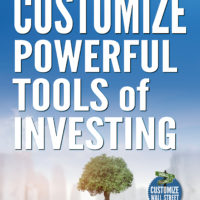How many Americans reach retirement age with minimal or no saving? How many of us go through life paycheck to paycheck, marveling at how others seem to have not only a handle on budgeting but also savings to which we can only aspire? I’ll tell you how many. A lot.
In my exuberance to write my first book, Customize Wall Street, I adopted an approach for helping readers plan for their future goals and dreams that might not have addressed the stress and worry over existing debts and other financial obligations. Perhaps I assumed that all Americans feel ready and capable of embarking on their financial plans, when in fact so many of us are more concerned about the amount of debt we are facing.
Safe to say, I’m sure we all want to have a secure retirement, or to give our children a quality education, or to buy our first or second home, or even to travel the world. But, many of us do not feel that we have a clean slate financially, and perhaps have greater debt than will allow us to address plans for our goals and dreams. We have student loans, credit card debt, large mortgages, car loans, and more.
I have been asked whether a person can begin to save and invest for a comfortable retirement, or other financial dream while at the same time suffering from the stress of large debt payments. How can I accumulate a nest egg for my future goals if I can’t sleep at night due to the burden of living paycheck to paycheck?
There is an ever-growing number of individuals and families who face substantial debts. Is it still possible, or even wise, to begin saving and investing for one’s future financial goals when dealing with debt?
My short answer is an emphatic “yes” we can. My reasoning might be best explained with a couple scenarios.
One example I commonly give comes from our own American legacy. Historically, families on the farm often had to struggle financially. Yet, grandma who was born and raised on the prairie had the habit and discipline to continually save a couple dollars or handful of coins for a possible “rainy day”. After each harvest time, when grandpa and the farm-hands returned home from selling their produce at market, she would take a portion of her household allowance and hide it under the mattress or in the cookie jar.
Naturally, the family had a mortgage loan at the bank they needed to pay to avoid losing the farm, but that didn’t stop grandma from regularly setting aside even the smallest amount for the future. Even if it meant they couldn’t build the new barn, or drill the new well for water, she saved for the future. Saving was a habit, a discipline, and an automatic endeavor. There is no reason that such a culture of habitual saving cannot be applied to this day.
Today’s Americans have the same opportunity to save (and to invest) on a regular, disciplined basis, even in spite of being under water in debt. If you work for a large or medium-sized corporation (and even small ones), your human resources department allows you to participate in your employer’s 401(k) retirement plan. A substantial percentage of such American companies will even match a portion of your regular payroll contributions to induce you to participate in their retirement savings program.
The modern 401(k) program is even better than Grandma’s system of socking her savings away under the mattress. With today’s corporate plans, each employee participant has the opportunity to select from a list of investments in which to deposit each paycheck contribution. Some of the choices are more risky, and others are less. In all cases, your retirement fund is allowed to grow at a compounding rate over the long-term until the time of retirement.
Saving and investing for your future financial well-being, as difficult as it might seem, can be separated from even the largest of one’s debt obligations. All it takes is a determined mindset and consistency.
In future articles, I will address budgeting as well as allocating various amounts that meet both debts and future savings. And we will address how to reach financial freedom from credit card debt.
Getting to the place where saving for the future is part of the norm and can be accomplished without stress and is easier than you might think. I look forward to discussing with you just how it can be accomplished.








